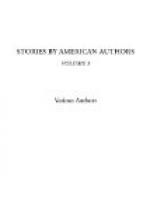evil more than for good. He is the victim, however,
of more illusions with regard to himself than I ever
knew a single brain to shelter. At the age of
twenty, poor, ignorant and remarkably handsome, he
married a woman of immense wealth, many years his
senior. At the end of three years she very considerately
took herself off and left him to the enjoyment of his
freedom and riches. If he had remained poor he
might from time to time have rubbed at random against
the truth, and would be able to recognize the touch
of it. But he wraps himself in his money as in
a wadded dressing-gown, and goes trundling through
life on his little gold wheels. The greater part
of his career, from the time of his marriage till
about ten years ago, was spent in Europe, which, superficially,
he knows very well. He has lived in fifty places,
known thousands of people, and spent a very large
fortune. At one time, I believe, he spent considerably
too much, trembled for an instant on the verge of a
pecuniary crash, but recovered himself, and found himself
more frightened than hurt, yet audibly recommended
to lower his pitch. He passed five years in a
species of penitent seclusion on the lake of—I
forget what (his genius seems to be partial to lakes),
and laid the basis of his present magnificent taste
for literature. I can’t call him anything
but magnificent in this respect, so long as he must
have his punctuation done by a nature distinguee.
At the close of this period, by economy, he had made
up his losses. His turning the screw during those
relatively impecunious years represents, I am pretty
sure, the only act of resolution of his life.
It was rendered possible by his morbid, his actually
pusillanimous dread of poverty; he doesn’t feel
safe without half a million between him and starvation.
Meanwhile he had turned from a young man into an old
man; his health was broken, his spirit was jaded,
and I imagine, to do him justice, that he began to
feel certain natural, filial longings for this dear
American mother of us all. They say the most
hopeless truants and triflers have come to it.
He came to it, at all events; he packed up his books
and pictures and gimcracks, and bade farewell to Europe.
This house which he now occupies belonged to his wife’s
estate. She had, for sentimental reasons of her
own, commended it to his particular care. On his
return he came to see it, liked it, turned a parcel
of carpenters and upholsterers into it, and by inhabiting
it for nine years transformed it into the perfect
dwelling which I find it. Here he has spent all
his time, with the exception of a usual winter’s
visit to New York—a practice recently discontinued,
owing to the increase of his ailments and the projection
of these famous memoirs. His life has finally
come to be passed in comparative solitude. He
tells of various distant relatives, as well as intimate
friends of both sexes, who used formerly to be entertained
at his cost; but with each of them, in the course




